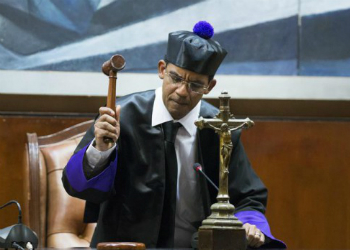Several top officials in the Dominican Republic have been remanded to pretrial detention for alleged ties with a massive graft scandal involving Brazilian construction giant Odebrecht, in a case that illustrates what made the island nation so ripe for corruption.*
Judge Francisco Ortega issued pretrial measures on June 7 for all fourteen of the high-profile suspects implicated in the Odebrecht scandal until their case is heard, reported El Nuevo Diario.
Ten of them, including Trade Minister Temístocles Montás, as well as other former ministers, prominent opposition figures, businessmen and executives of state-owned companies, were arrested on May 29.
Dominican authorities have charged the suspects with money laundering, submitting false statements and bribery in connection with the $92 million in illicit payments that representatives of the Brazilian company shelled out to Dominican officials in exchange for securing 17 public work contracts worth a total value of $163 million between 2001 and 2014.
Odebrecht, Brazil’s largest construction firm, admitted last year that it had paid nearly $800 million in bribes to officials in a dozen countries in exchange for help winning bids for public works contracts.
Minister Montás resigned after his arrest, but has denied wrongdoings as well as several other defendants, reported Reuters.
The Dominican Republic’s Attorney General’s Office (Procuraduría General de la República – PGR) also issued a warrant for the arrest of another suspect, currently in Panama, and sought to revoke the parliamentary immunity of three sitting senators also implicated in the corruption scandal.
SEE ALSO: Coverage of the Dominican Republic
According to El Nuevo Diario, Judge Ortega ordered nine of the fourteen suspects be sent to prison and sentenced another two to house arrest until their case is heard. Immunity for the sitting senators was not lifted, but the three were ordered to pay $100,000 in bail each, and were barred from leaving the country.
“We can qualify this as an unprecedented event because of the multitude of crimes and the position of power of those involved,” said Attorney General Jean Alain Rodríguez in comments reported by the Associated Press on May 29.
The trial is expected to start in eight months.
InSight Crime Analysis
The Dominican Republic was particularly susceptible to Odebrecht bribes because the Brazilian company had no competitors in the country, and high levels of corruption among elites made it easy for Odebrecht representatives to win large infrastructure contracts.
“A giant like Odebrecht didn’t have any real competitor in a small country like the Dominican Republic,” the correspondent for the Associated Press in the country, Ezequiel Abiú López, told InSight Crime.
Indeed, of all the countries infiltrated by Odebrecht the Dominican Republic received the third largest amount of bribes. The $92 million in bribes paid to Dominican officials earned Odebrecht an estimated $163 million in public works contracts, a return of $1.7 million in profits for every $1 million in bribes. While the figures are significantly smaller than those recorded in Brazil, where authorities estimate Odebrecht gained $4 million in contracts for every $1 million paid out to politicians, they are nonetheless significant.
But the ease with which Odebrecht could infiltrate the Dominican Republic also owes to structural issues that facilitate corruption among the elite.
“Local officials found in Odebrecht a gold mine through which they could finance their electoral campaigns,” Abiú López observed. “And it is crucial to stress that the country does not have a law that forces political parties to reveal the sources of funding for their campaigns.”
The extent to which corruption has infected Dominican politics is exemplified by the fact that a man responsible for investigation corruption was himself implicated in the graft scandal. César Sánchez, whom President Danilo Medina appointed to investigate the alleged inflated costs of the Punta Catalina power plant, a large infrastructure project whose contract had been won by Odebrecht, was among the suspects arrested on May 29.
SEE ALSO: InDepth Coverage of Elites and Organized Crime
And while Attorney General Rodríguez may be right in touting this week’s operation as unprecedented — as no country official had been formally arrested in connection with the scandal until May 29 — Dominican prosecutors have moved more slowly compared to other countries in the region.
According to Abiú López, this might have been a deliberate political decision by the ruling Dominican Liberation Party (Partido de la Liberación Dominicana – PLD) party. “It is possible that the PLD was trying to reduce the political impact [of the investigations] on the government, while deciding which of the officials and members of the party could be sent to court, in order to reduce people’s criticism.”
But people also fear the investigations won’t uncover the full extent of corruption among elites in the country.
Indeed, Rodríguez, a PLD member, has already struck a deal with Odebrecht, ensuring the company will pay a $184 million fine for the crimes committed in the Dominican Republic, and will commit to disclosing information on local bribe recipients in exchange for not having its executives prosecuted.
Civil society groups have already emerged to call for tougher actions against corrupted officials, including the Green Movement, which has called for an independent probe into the graft scheme.
* UPDATE, June 9: This article has been updated to clarify several points in the analysis.

